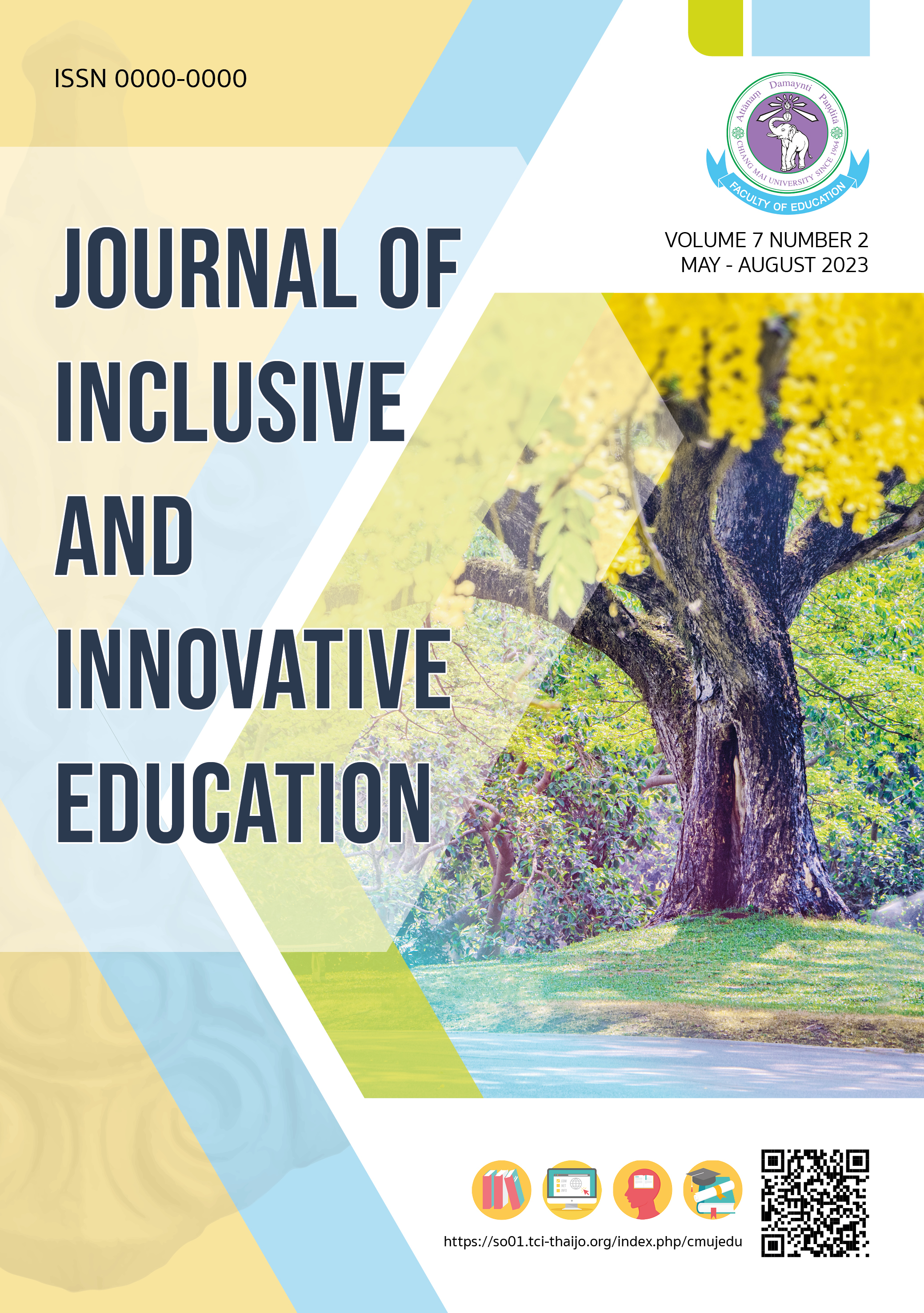การจัดการเรียนรู้แบบสืบเสาะหาความรู้โดยใช้ประเด็นทางสังคมที่เกี่ยวเนื่องกับ วิทยาศาสตร์เป็นฐาน เรื่อง กรด-เบส ที่มีผลต่อสมรรถนะในการประเมินและออกแบบ การสืบเสาะหาความรู้ทางวิทยาศาสตร์ของนักเรียนชั้นมัธยมศึกษาปีที่ 5
Main Article Content
บทคัดย่อ
การสืบเสาะหาความรู้โดยใช้ประเด็นทางสังคมที่เกี่ยวเนื่องกับวิทยาศาสตร์เป็นฐานเป็นรูปแบบการจัดการเรียนรู้ที่ให้นักเรียนตั้งคำถามเกี่ยวกับประเด็นปัญหาที่ซับซ้อนพบในชีวิตประจำวันได้ค้นหาคำตอบทางวิทยาศาสตร์ผ่านกระบวนการสืบเสาะหาความรู้ และนำคำตอบไปให้คำแนะนำกับบุคคลอื่นเพื่อประกอบการตัดสินใจเกี่ยวกับประเด็นปัญหานั้น วัตถุประสงค์ของการวิจัยครั้งนี้เพื่อศึกษาผลของการสืบเสาะหาความรู้โดยใช้ประเด็นทางสังคมที่เกี่ยวเนื่องกับวิทยาศาสตร์เป็นฐานที่มีต่อสมรรถนะในการประเมินและออกแบบการสืบเสาะหาความรู้ทางวิทยาศาสตร์ของนักเรียน เรื่อง กรด-เบส วิธีการเชิงคุณภาพนำมาใช้กลุ่มนักเรียนชั้นมัธยมศึกษาปีที่ 5 จำนวน 27 คน ที่ศึกษาโรงเรียนแห่งหนึ่งของอำเภอเมืองขอนแก่น จังหวัดขอนแก่น ข้อมูลที่ใช้ในงานวิจัยนี้เก็บรวบรวมจากแบบวัดสมรรถนะการประเมินและออกแบบการสืบเสาะหาความรู้ทางวิทยาศาสตร์ และการสัมภาษณ์แบบกึ่งโครงสร้างนำมาใช้เพื่อประเมินสมรรถนะในการประเมินและออกแบบการสืบเสาะหาความรู้ทางวิทยาศาสตร์ ผู้วิจัยนำการวิเคราะห์เชิงเนื้อหามาวิเคราะห์ข้อมูลต่างๆ ผลการวิจัยพบว่า นักเรียนส่วนใหญ่มีสมรรถนะการประเมินและออกแบบการสืบเสาะหาความรู้ทางวิทยาศาสตร์เพิ่มจากระดับปรับปรุงเป็นระดับดีขึ้น การวิจัยครั้งนี้แสดงให้เห็นว่าการสืบเสาะหาความรู้โดยใช้ประเด็นทางสังคมที่เกี่ยวเนื่องกับวิทยาศาสตร์เป็นฐานสามารถช่วยให้นักเรียนเกิดสมรรถนะการประเมินและออกแบบการสืบเสาะหาความรู้ทางวิทยาศาสตร์ได้ โดยจะช่วยให้นักเรียนหาคำตอบบนพื้นฐานของหลักฐานที่ได้จากกระบวนการสืบเสาะหาความรู้และคำนึงถึงการมีส่วนร่วมในการรับผิดชอบต่อประเด็นปัญหาทางสังคม
Article Details

อนุญาตภายใต้เงื่อนไข Creative Commons Attribution-NonCommercial-NoDerivatives 4.0 International License.
หากผู้เสนอบทความมีความจำเป็นเร่งด่วนในการตีพิมพ์โปรดส่งลงตีพิมพ์ในวารสารฉบับอื่นแทน โดยกองบรรณาธิการจะไม่รับบทความหากผู้เสนอบทความไม่ปฏิบัติตามเงื่อนไขและขั้นตอนที่กำหนดอย่างเคร่งครัด ข้อมูลของเนื้อหาในบทความถือเป็นลิขสิทธิ์ของ Journal of Inclusive and Innovative Education คณะศึกษาศาสตร์ มหาวิทยาลัยเชียงใหม่
เอกสารอ้างอิง
Alcaraz-Dominguez, S., & Barajas, M. (2021). Conceiving Socioscientific Issues in STEM Lessons from Science Education Research and Practice. Education Science, 11(5), 238.
Ariza, M.R., Abril, A.M., & Quesada, A. (2017). Design and evaluation of teaching materials for Responsible Research and Innovation. Sisyphus-J. Educ, 5(3), 28-43.
Ariza, M.R., Christodoulou, A., van Harskamp, M., Knippels, M.C.P.J., Kyza, E.A., Levinson, R. et al. (2021). Socio-Scientific Inquiry-Based Learning as a Means toward Environmental Citizenship. Sustainability, 13(20), 11509.
Berland, L.K., & Reiser, B.J. (2008). Making sense of argumentation and explanation. Science Education, 93(1), 26-55.
Chaimongkol, P., Chanunan, S., & Klamtet, J. (2017). Development of scientific reasoning ability in stoichiometry unit using argument-driven inquiry instructional model. Journal of Research Unit on Science, Technology and Environment for Learning, 8(1), 27-40.
Chen, Y.C., Pan, Y.T., Hong, Z.R., Weng, X.F., & Lin, H.S. (2020). Exploring the pedagogical features of integrating essential competencies of scientific inquiry in classroom teaching. Research in Science & Technological Education, 38(2), 185-207.
Dudas, C., Rundgren, C.J., & Lundegård, I. (2022). Exploratory Considerations in Chemistry Education—Didactic Modelling for Complexity in Students’ Discussions. Science & Education (2022).
Dukerich, L. (2015). Applying modeling instruction to high school chemistry to improve students’ conceptual understanding. Journal of Chemical Education, 92(8), 1315-1319.
Knippels, M.C., & Van Harskamp, M. (2018). An educational sequence for implementing socio-scientific inquiry-based learning (SSIBL). Science and society, 100(371), 46-50.
Kulatunga, U., Moog, R., & Lewis, J. (2013). Argumentation and participation patterns in general chemistry peer-led sessions. Journal of Research in Science Teaching, 50(10), 1207-1231.
Kruit, P.M., Oostdam, R.J., Van den Berg, E., & Schuitema, J.A. (2018). Assessing students’ ability in performing scientific inquiry: Instruments for measuring complex science skills in primary education. Research in Science and Technological Education, 36(4), 413-439.
Levinson, R. (2018). Introducing socio-scientific inquiry-based learning (SSIBL). School Science Review, 100(371), 31-35.
Mat Noor, M.S.A. (2021). Assessing secondary students’ scientific literacy: A comparative study of suburban schools in England and Malaysia. Science Education International, 32(4), 343-352.
OECD. (2019). "PISA 2018 Science Framework" in PISA 2018 Assessment and Analytical Framework. Paris: OECD Publishing.
Phabchai, P. (2020). Developing scientific literacy in the topic of acid-base using context-based learning management for grade 11th students. Journal of Education Naresuan University. 22(3), 164-176.
The Institute for the Promotion of Teaching Science and Technology (IPST). (2561). The result of PISA 2015 in mathematic literacy, reading literacy and scientific literacy. Bangkok: Aroonprinting. [in Thai]
The Institute for the Promotion of Teaching Science and Technology (IPST). (2554). Professional science teacher Guidelines for Effective Teaching. Bangkok: Inter Education Supplies. [in Thai]
Tuba, D., & Sedat, U. (2015). Investigating the effect of argument-driven inquiry in laboratory instruction. Educational Sciences: Theory & Practice, 15(1), 267-283.
Watayotha, K. (2019). Creative thinking of the learners with constructivist multimedia learning environment and augmented reality to promote creative thinking on the topic of product creation by technological process for grade 8 students. Veridian E-Journal, Silpakorn University (Humanities, Social Sciences and arts), 12(2), 499-518.


